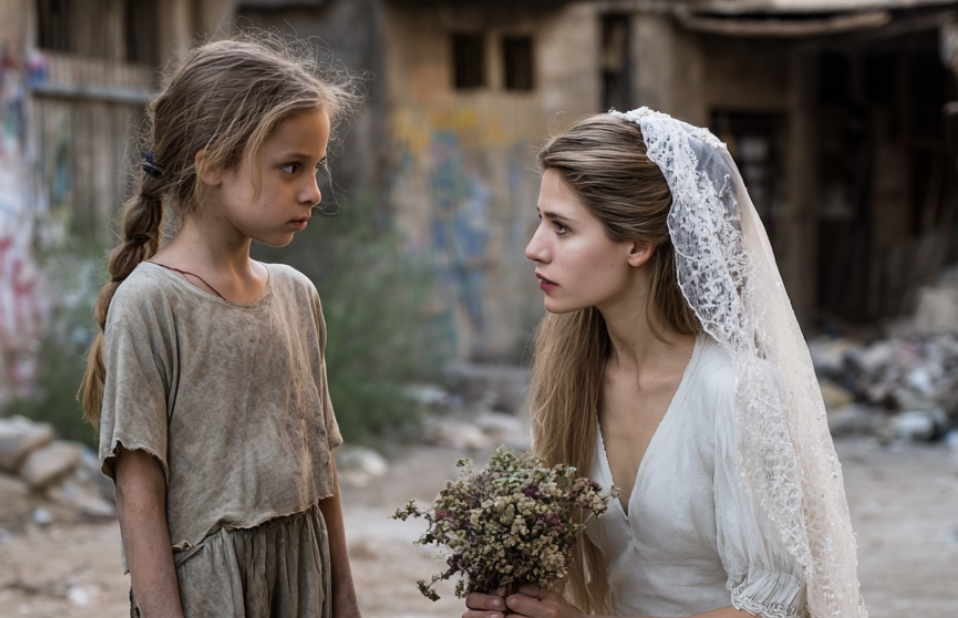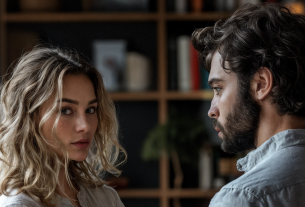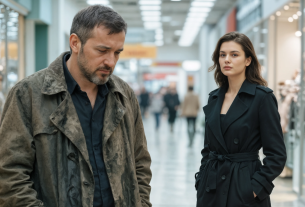“I definitely wouldn’t marry a man like that!” rang out a clear, bright child’s voice in the silence—surprisingly confident for someone so young.
Marina flinched and turned sharply. In front of her stood a little girl—about six, with a long fair braid, a worn jacket, and eyes that held a strange, beyond-her-years clarity.
The bride in a snow-white dress, rustling with every step, froze at the entrance to the restaurant. Inside, guests, music, a three-tier cake, and the groom—Artyom—were waiting. But the child’s words pierced the hush like a thunderclap.
“Sorry… what did you say?” Marina asked again, trying to smile, though something inside her gave a little jolt, like an alarm bell.
The girl shrugged.
“He’s mean. I saw him yesterday. He pushed my mom.”
Marina frowned. Her heart started pounding. She crouched to be at the girl’s level.
“What’s his name?”
“Artyom. He came to our place yesterday. He yelled. Mom cried after.” The girl wiped her nose with her sleeve. “I thought he was just an acquaintance, and then I saw—he’s your groom…”
Marina walked into the restaurant as if through a dense fog. Everything around her—chandeliers, smiles, camera flashes—felt distant, not her own.
Artyom came up quickly, flashing a dazzling smile.
“Everything okay, sweetheart?”
“Tell me…” Her voice trembled. “Were you with a woman and a child yesterday?”
Artyom froze. For a moment something flickered in his eyes—fear? guilt?—but then he scowled.
“What nonsense is this? Of course not! Is this a joke? Have you lost it on a day like this?”
“The girl had a braid. She said you pushed her mother. That you came by yesterday.”
“Kids get all sorts of ideas!” he snapped. “You didn’t actually believe her, did you?”
Marina looked at him, and for the first time she saw—not a groom, but a stranger. Strong, self-assured, in an expensive suit… with cold in his eyes.
“I’ll be right back,” she said quietly, took off her veil, and headed for the exit.
The girl was waiting in the same spot.
“Will you show me where you live?”
She nodded silently.
It was only a few blocks away. The girl ran ahead; Marina followed, holding up the hem of her dress. They turned into a courtyard—old, with a rusty slide and broken windows on the third floor.
“This is us. Mom’s home.”
Marina climbed the creaking stairs behind her. The girl opened the door with a key.
The room was cold. A young woman sat on the floor by the radiator, hugging a notebook. She looked up.
“I… don’t know who you are,” she whispered.
“I’m Marina. Today I was supposed to marry Artyom.”
The woman went pale and pulled her daughter closer.
“He… didn’t say he was getting married.”
“Did he push you yesterday?”
“Yes. When I said I didn’t want this anymore. We were together for two years. He promised he’d divorce and start a new life. But then everything changed. He started shouting, forbade me to work. And yesterday he came drunk. He wanted to take Polina. He said, ‘You’re nobody. But she’s mine. I can do whatever I want with her.’”
Marina sat down on the edge of the rug. Her throat tightened. She wanted to cry, but inside there was only emptiness.
“Why didn’t you go to the police?”
“Who would listen to me? I have no job, no support. And he’s rich, influential.”
The girl pressed herself quietly to her mother.
“Mom, she’s nice…”
That evening Marina didn’t return to the wedding hotel but to her own apartment. It was quiet there. Only the cat curled up purring in her lap.
Her phone wouldn’t stop ringing: first her friend, then her mother, then Artyom himself.
She didn’t answer.
Then she opened her messenger. His message:
“You made a spectacle of me! You’ll regret this!”
She simply tapped “Block.”
A month passed. Life slowly found a new rhythm. Marina started working at a center that helped women in difficult situations. And one day she saw that same mother there again—Natalia.
Now Natalia was learning to sew, taking part in fairs, and her daughter Polina wore a bright ribbon and no longer hid behind her mother’s back.
“Thank you,” Natalia said one day. “You saved us without even knowing it.”
Marina only smiled.
One evening, as they were walking in the park, Polina suddenly took her hand.
“I told you all that because you were beautiful but very sad. And I got scared that you would start crying too, like Mom.”
Marina squeezed her little hand.
“Thank you, Polina. Because of you, I got out too.”
And for the first time in a long while, she smiled for real.
The real tears came later—when she was alone.
Marina closed the door, took off her coat, sank to the floor in the entryway, and finally allowed herself to cry—to sob, to let go. The pain wasn’t only that Artyom had turned out to be a liar. It was deeper—an ache that she had never truly been wanted. Not in childhood, not in youth, not now. All her life she had tried to be “right”—pretty, smart, agreeable, the “perfect wife.”
But who was she—really?
She sat down at the table and wrote a letter—not to anyone else. To herself:
“You deserve more. You are not a thing. You should be loved not for your looks, but for who you are. You don’t have to keep quiet to be accepted. You don’t have to endure for the sake of being ‘nice.’ You are a person. Alive, real, feeling. You have the right to be happy. To be weak. To be yourself. And to have the right to choose.”
The next morning she woke up different, as if she’d shed an old, tight skin. She went to the hairdresser and, for the first time, didn’t ask, “Does this look good on me?” She simply said, “Do what I want.”
And the world around her felt different. The air—softer. The sun—warmer. She began to hear herself.
Natalia and Polina became her family. They came over—at first for tea, then to read books, watch movies, and make crafts together.
One day Marina fell asleep in an armchair. When she woke, a child’s blanket had been carefully laid over her, and beside her lay a paper flower. Polina whispered softly:
“You’re ours now.”
And Marina cried—without shame, without holding back.
Life gradually found a new rhythm. Marina began hosting meetings for women in difficult circumstances—women who had once been as she was. She helped with paperwork, looked for housing, supported them in finding work.
And in each of them—tired, frightened, shoulders slumped—she recognized a reflection of her former self.
And she said quietly but firmly:
“I know how much it hurts. But let’s start with the most important thing—with you. With your ‘I.’”
Six months later she happened to see Artyom—in a café on the corner, at a table with a new girlfriend. He laughed loudly, stroked her hand in a showy way, as if to prove to the world everything was fine.
He didn’t notice her.
She looked at him—not with pain, not with resentment, but with mild surprise. Like an old photograph where everything has faded and the faces are no longer recognizable. Like a stranger. And suddenly she understood: he could no longer hurt her—neither her heart nor her life. His shadow no longer lay across her path.
And Polina…
Polina now left her notes more and more often—on magnets on the fridge.
“You’re the kindest!”
“I want to be like you!”
“Mom smiles every day now.”
And one day, on Marina’s birthday, the girl came with a big box. Inside was a homemade cake decorated with jelly candies and a card with crooked letters:
“You became a bride—but not to that man.
You became the bride of our family.
We chose you ourselves.”
Marina hugged them both tightly—Natalia and Polina.
And for the first time, she truly felt she was home.
Not in a fancy house, not in a wedding dress, not under applause.
Just—home.
In a heart that is warm. Where you are awaited. Where you are loved not for the image, not for success, not for appearance—
but simply for being you.
Eight years passed.
Polina grew up—from a skinny, shy girl with frightened eyes into a strong, bright young woman. The same eyes, but now they shone not with suffering, but with faith, courage, and dreams. She entered a teacher-training college. Her goal was simple:
“So that no child ever feels alone. So that everyone knows—they are valued.”
By then, Marina was no longer just helping—she had opened her own center. Small and warm, in an old house with wooden windows and gentle light. There were children’s toys, books, cozy armchairs with throws. And most importantly—the light was always on. Not the electric kind, but the human kind. Women came here who had lost their homes, their hope, themselves. And here they were truly welcomed.
Natalia changed too. She completed accounting courses, found a job, rented a bright apartment. Once quiet, afraid of her own shadow, now she could calmly say:
“No. That’s not part of my job. I have boundaries.”
They became a family. Not by blood—by choice. By heart.
And then, on a warm spring day, Marina stood by a big window, her forehead resting against the glass. Down in the garden, girls were decorating a floral arch. The air smelled of lilacs; soft music played; women laughed.
Today was a wedding.
But not hers.
Today Polina was getting married.
Marina had spent a long time choosing a dress. Not white—that was the bride’s day. But light, soft, with a gentle sheen. The dress she once couldn’t wear. And now—she could.
When the music started, everyone stood. Polina walked slowly, in a long white dress, with a wreath of fresh flowers. And beside her—not a father, not a relative, but Marina. They walked hand in hand.
All the while they moved down the path strewn with petals, Polina didn’t take her eyes off her. And when they reached the altar, she turned and whispered:
“You are my family. You saved me. Mom gave me life, and you taught me how to live.”
Marina wanted to answer but couldn’t. The words stuck in her throat. Only tears ran down her cheeks.
But they weren’t tears of pain.
They were tears of release. Tears of healing.
After the wedding, as dusk settled, Marina stepped out into the garden. The air was heavy with the scent of lilacs and fresh cake. Someone was dancing, someone hugging their children; in the corner a guitar played softly.
Suddenly a quiet voice sounded behind her.
“May I sit?”
She turned. In front of her stood a man of about fifty, gray at the temples, with kind, slightly tired eyes. He was holding a cup of tea.
“I’m the groom’s father,” he smiled. “And you—you’re Polina’s mom?”
Marina smiled gently in return.
“Not exactly. More like… a mother by fate.”
He looked at her for a long moment.
“You know… that’s even more important.”
They talked for a long time—about books, about losses, about how to survive loneliness. He had been widowed two years earlier. He understood what it meant to start from scratch when it feels like the world has stopped.
And suddenly Marina felt calm. Not anxious. Not wary. Just—well.
When he left, she remained standing under an old cherry tree, gazing up at the clear evening sky.
The stars were just coming out—like drops of light on dark watercolor.
And in the quiet she whispered:
“Thank you, fate.
Thank you for that little girl with the braid by the restaurant.
For the tears that taught me to value things.
For the falls after which I learned to rise.
And—for the meeting.
Not back then.
But right on time.”
A wooden hand-carved sign now hung above the center’s entrance:
“A home where you can begin again.”
And every time new women with children came here, Marina looked at them and remembered that day.
That voice.
Those words:
“I wouldn’t marry a man like that!”
One child’s cry—honest, sincere, like a heartbeat—changed not just a wedding.
It changed everything.
And now she knew:
Sometimes the simplest word, spoken by a small heart, becomes a beacon in the darkest night.
And it leads you not just toward the light—
but home.
Toward love.
Toward yourself.



